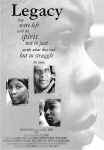|
Roger
Ebert
Legacy
is the story of how a family from a Chicago housing project, devastated
by the murder of a 14-year old relative, was able to break the cycle of
welfare and make a new beginning.
Five
years ago the Chicago media gave great attention to the death of
Terrell  Collins, a 14-year-old honor student who was senselessly killed by
another child with a gun. Terrell had been chosen by documentarian Tod
S. Lending, as the subject of
a film about a young man from the tough Harry Horner
housing project who was headed to a private school on a scholarship.
Collins, a 14-year-old honor student who was senselessly killed by
another child with a gun. Terrell had been chosen by documentarian Tod
S. Lending, as the subject of
a film about a young man from the tough Harry Horner
housing project who was headed to a private school on a scholarship.
"I
did the first filming one morning," Lending recalls, "and two
hours later I got a call that Terrell had been shot."

click
for larger image
|
|
He filmed the
funeral, and then kept on filming, focusing on Terrell's extended
family. His narrator became Nickcole Collins, about Terrell's age, and in
the film she introduces us to her grandmother Dorothy, her mother
Alaissa and her aunt Wanda, who was Terrell's mother. Theirs was a
three-generation welfare family, with Dorothy as the rock of support.
Wanda, a drug addict, had six children out of wedlock, and
Alaissa had five. No fathers were still in the picture.
In a strange
sense, Nickcole tells us, the death of Terrell acted as a catalyst. He was
the family's great hope, the straight-A student who was their shining
light. When he died, the family decided in some deep unspoken way, to
try to pull itself together and get off welfare. It is not easy. In a
Catch-22, Alaissa loses a job because she can't attend training sessions
without leaving her children untended; welfare won't provide child care
until she gets the job.
But by the
end of five years, Nickcole, a student at Northern Illinois University, is
able to report that her mother is teaching kindergarten, her aunt is
clean and sober, her grandmother has bought her own home - and the hated
Harry Horner project has been torn down. It is an inspiring story and a
moving film.
|